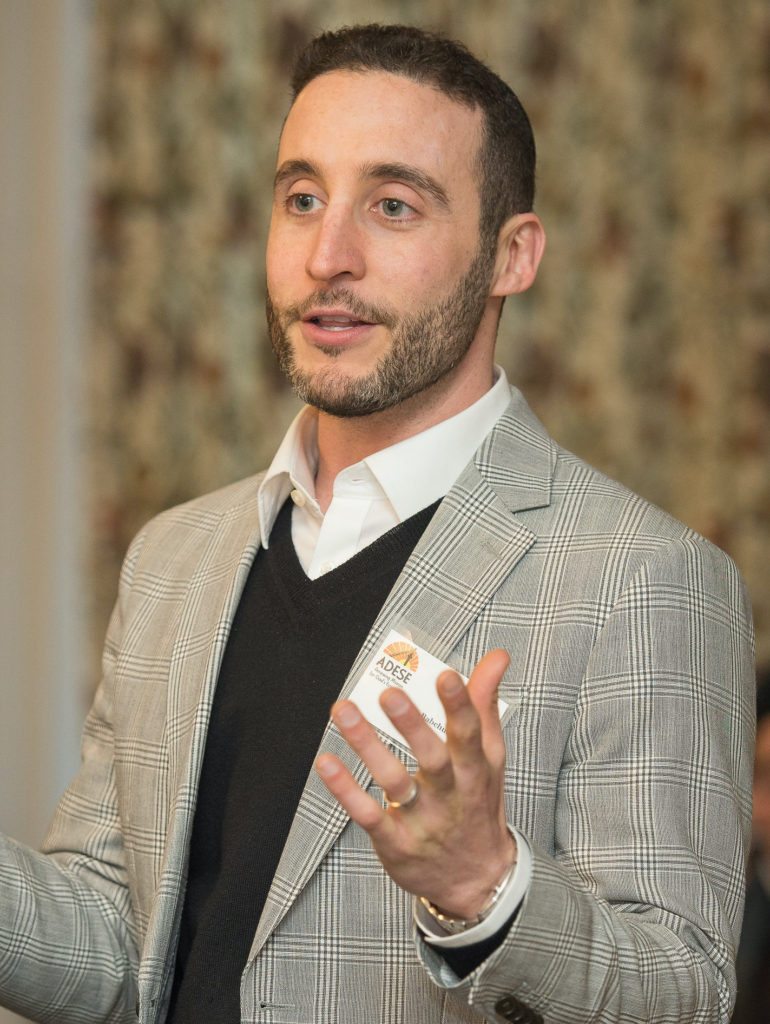My son Micah, while only an adolescent, has a very old soul. Not like Walter Matthau in Grumpy Old Men (although sometimes yes), but rather like someone who – for as long as I can recall – has moved through the world with a deep sense of wonder. As soon as he could speak, everything came out in the form of a question. He was constantly tugging at the ontological threads of life’s great mysteries, from why the sky was blue, to why God created us in such a way that we could feel pain. Rarely content with the first answer he found, most of his questions would yield more questions, each one designed to get a deeper truth than the last, peeling away the layers of the onion that is our world.
So last week, it came as no surprise when Micah asked me the most important question that humankind has ever pondered, with only a 3-minute drive during which to answer it (in fairness, everything in Providence is 3 minutes away from everything else in Providence, so he’s gotten quite good at squeezing big talks into short drives).
“Abba, what is the meaning of life? Like, I’ve heard people say that it’s about finding what makes you happy and doing that. And you and I have talked about helping others as being really important, too. But it kind of feels like everybody has their own answer.”
As I’ve learned over my years of parenting, these moments in which the mundane gives way to the transcendent come with no advance notice. You never know when a simple back-and-forth will unfold into the most important conversation you’ll have all year. When a backyard game of catch becomes one of those quintessential memories of parenthood. When the impromptu ice cream excursion yields the sweetest moment of the summer. So when Micah opened with this question about life, I knew I didn’t want to miss out on what it could lead to.
Taking care not to give him a pre-packaged answer (he’s got a finely-tuned BS detector), I volleyed the question back to him. “What do you think it is, for you?”
“Well, I kind of think it’s a good thing that everybody has their own answer. Like maybe my purpose is to find out what I’m really good at, that also helps people, and then do that.”
“That’s a really thoughtful answer, Micah. It sounds like you’re well on your way to figuring things out, right?”
“But what about once you’ve found your purpose? What’s your purpose then?”
Noting that we were approaching our destination (Hebrew School) with no time to spare before the bell, I tried to leave him with an answer that would satisfy his curiosity until we picked up the conversation again while still giving him food for thought in the meantime. In other words, I did my best Yoda impression:
“What’s your purpose once you’ve found your purpose? To keep looking, Micah. To keep looking.”
Commands and Calls
As the book of Leviticus – Vayikra (“and God called”) in Hebrew – begins, we read a strange phrase in the first verse. “God called to Moses, and spoke to him…” (Leviticus 1:1). Why use two different verbs to describe what seems to be an otherwise simple act (i.e. telling Moses something)?
The medieval commentator Rashi, bothered by the same redundancy, ascribes a deep meaning to it. Throughout the book of Leviticus, he notes, “every speech, utterance, and command is preceded by a call.” Each word shared by God with Moses holds such importance that God first issues a calling to Moses, helping him to center his attention on the critically important charge to come. For both of them, stationed at Mount Sinai, each word held infinite possibilities for the fate of the Israelites, every utterance an eternity.
Here, Rashi sheds light on not one but two powerful lessons. The first is that God’s call to Moses was conveyed in love. As interpreted by Rabbi Jonathan Sacks of blessed memory:
“Vayikra, Rashi tells us, means ‘to be called to a mission in love’. This is the source of one of the key ideas of Western thought, the concept of a vocation or a calling, i.e., choosing a career or way of life not just because you want to do it, nor because it offers certain benefits, but because you feel summoned to it…This is what you were placed on earth to do.
“When we see a wrong to be righted, a sickness to be healed, a need to be met, and we feel it speaking to us, that is when we come as close as we can…to hearing Vayikra, God’s call.” (Covenant and Conversation Vol 2, Rabbi Jonathan Sacks)
Sacks invites us to ponder the very same question that Micah asked me from the backseat: “What is the meaning of life?” Or, perhaps: “What is the meaning of my life?” By particularizing the universal, we are invited to attune ourselves to receive God’s call – no matter what form it may take.
Hearing that call means allowing it to put a claim on your heart. To accept a call is more than to sign a job contract or to say “yes” to an invitation. It is to commit one’s life, one’s livelihood, one’s lifeblood, to the fulfillment of that mission. Nechama Leibowitz, the 20th-century Israeli Bible scholar, noted that the burnt sacrifice discussed in the first chapter of this week’s Parashah (the “Olah”) must be the “choicest offering” (New Studies in Vayikra). In other words, not only must the sacrifice be “brought willingly” (Abravanel commentary), but it must be the best that you have to give.
Meaning Matters
Certainly, we in the Western world have witnessed a movement over the last 30 years, such that we are now encouraged to find meaning and purpose at work. Whether you take the cynical perspective (that this “movement” was actually created by corporations to encourage greater productivity and sacrifice for the “greater good”) or the hopeful one (that it was a worker-driven movement to reclaim dignity and power in the workplace), the results are clear: meaning matters. So much, in fact, that nine out of ten Americans would trade higher pay for more meaningful work 1, and 70% of employees say that their personal sense of purpose is defined by their work 2.
Whether you are someone who finds deep meaning in your work, or someone whose purpose lies outside of the 9-5, what is clear is that God, Rashi, and McKinsey all agree: we bring more of ourselves into the world when we feel truly called to do so, and all the more so when those gifts that we bring to bear are called with love.
Constant Callings
The second key insight that Rashi brings to us is precisely what I had hoped to convey to Micah during our brief philosophical conversation: we are not called just one time in our lives. There is a call before every invitation, every word, every yearning. There is a call coming from every person left behind, every heart left broken, every spirit left burdened. There is always a call, and the only question for us to ask is: are we listening?
Viktor Frankl, in his seminal work Man’s Search for Meaning – which recounted his time in the Nazi concentration camps – encouraged us not to wait for God to call us but rather for each of us to activate our listening instead.
“It did not really matter what we expected from life, but rather what life expected from us. We needed to stop asking about the meaning of life, and instead to think of ourselves as those who were being questioned by life—daily and hourly. Our answer must consist, not in talk and meditation, but in right action and in right conduct. Life ultimately means taking the responsibility to find the right answer to its problems and to fulfill the tasks which it constantly sets for each individual.”
(Viktor E. Frankl, Man’s Search for Meaning)
We are called not once in life, but each day, each hour, each precious moment. And it is not a monologue; a true calling puts a claim on the One who calls and the one who is being called.
When Time Stands Still
Remarkably, Frankl – whose sense of purpose came from his service to his fellow prisoners – wrote this whole book in just nine days. One can imagine that there were moments during that outpouring of wisdom that time stood still for him – perhaps both for better and for worse, given the context in which he lived out each of those nine days. And as a result, he produced one of the greatest works of philosophy in the 20th century – and perhaps of all time – in just over one week.
The Book of Leviticus, too, seems to pause time. While Genesis covers roughly 2,000 years and Exodus covers 80, Leviticus spans only 30 days in time. Once Moses receives his call, he gives himself over so completely to living into it, that it seems to break with the metaphysics of linear time.
Moses stands still in order to hear God’s word, and time stands still so that he can fulfill it.
May each of us – whether we only have 3 precious minutes in the car with a loved one or 30 years of career planning ahead of us – be blessed with the gift of hearing a call, the conviction to answer it, and the faithfulness to never stop listening for new ones along the way.

Rabbi Elan Babchuck is committed to leaving behind a world that is more compassionate and connected than the one he found. In pursuit of that commitment he serves as the Executive Vice President at Clal, the National Jewish Center for Learning and Leadership, and the Founding Executive Director of Glean Network, which partners with Columbia Business School. He was ordained in 2012, and earned his MBA that year, as well.
A sought-after thought leader, he has delivered keynotes at stages ranging from TEDx to the US Army’s General Officer Convocation, published in The Atlantic, The Guardian, Washington Post, and Religion News Service, has a column for The Wisdom Daily, contributed to Meaning Making – 8 Values That Drive America’s Newest Generations (2020, St. Mary’s Press) and is the co-author of the forthcoming book Picking Up the Pieces: Leadership After Empire (2023, Fortress Press).
He also serves as:
a Founding Partner of Starts With Us, a movement to counteract toxic polarization in America,
a Research Advisory Board Member of Springtide Research Institute, which focuses on spirituality, mental health and Gen Z,
a founding board member of Beloved Network, a network of startup Jewish communities, and
a member of the Board of Advisors of the Changemaker Initiative.
He lives in Providence, Rhode Island with his wife, Lizzie Pollock, and their three children: Micah, Nessa, and Ayla. In his spare time, he finds sanctuary while climbing rock walls around New England and tending to his backyard garden.
- https://hbr.org/2018/11/9-out-of-10-people-are-willing-to-earn-less-money-to-do-more-meaningful-work[↩]
- https://www.mckinsey.com/business-functions/people-and-organizational-performance/our-insights/the-great-attrition-is-making-hiring-harder-are-you-searching-the-right-talent-pools[↩]

